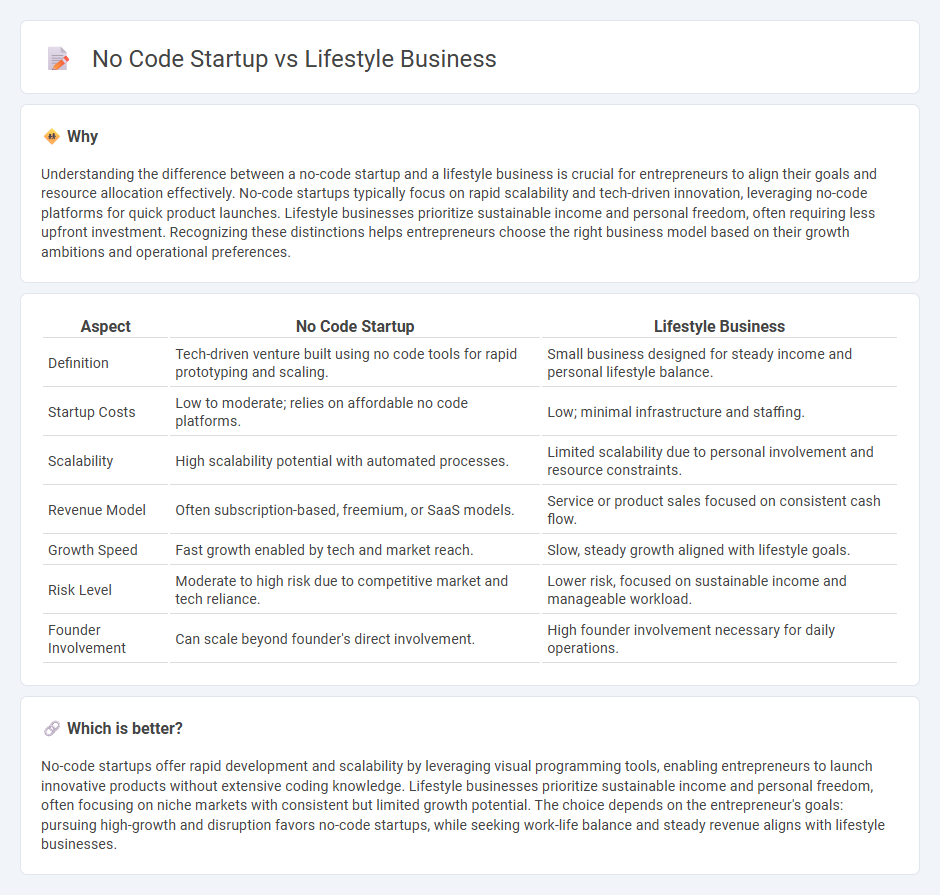
No-code startups leverage visual development platforms to launch scalable technology ventures quickly without traditional coding, enabling entrepreneurs to focus on growth and innovation. Lifestyle businesses prioritize sustainable income with flexibility and personal fulfillment, often operating on smaller scales with lower risk profiles. Explore how each approach aligns with your entrepreneurial goals and resources.
Why it is important
Understanding the difference between a no-code startup and a lifestyle business is crucial for entrepreneurs to align their goals and resource allocation effectively. No-code startups typically focus on rapid scalability and tech-driven innovation, leveraging no-code platforms for quick product launches. Lifestyle businesses prioritize sustainable income and personal freedom, often requiring less upfront investment. Recognizing these distinctions helps entrepreneurs choose the right business model based on their growth ambitions and operational preferences.
Comparison Table
| Aspect | No Code Startup | Lifestyle Business |
|---|---|---|
| Definition | Tech-driven venture built using no code tools for rapid prototyping and scaling. | Small business designed for steady income and personal lifestyle balance. |
| Startup Costs | Low to moderate; relies on affordable no code platforms. | Low; minimal infrastructure and staffing. |
| Scalability | High scalability potential with automated processes. | Limited scalability due to personal involvement and resource constraints. |
| Revenue Model | Often subscription-based, freemium, or SaaS models. | Service or product sales focused on consistent cash flow. |
| Growth Speed | Fast growth enabled by tech and market reach. | Slow, steady growth aligned with lifestyle goals. |
| Risk Level | Moderate to high risk due to competitive market and tech reliance. | Lower risk, focused on sustainable income and manageable workload. |
| Founder Involvement | Can scale beyond founder's direct involvement. | High founder involvement necessary for daily operations. |
Which is better?
No-code startups offer rapid development and scalability by leveraging visual programming tools, enabling entrepreneurs to launch innovative products without extensive coding knowledge. Lifestyle businesses prioritize sustainable income and personal freedom, often focusing on niche markets with consistent but limited growth potential. The choice depends on the entrepreneur's goals: pursuing high-growth and disruption favors no-code startups, while seeking work-life balance and steady revenue aligns with lifestyle businesses.
Connection
No code startups empower entrepreneurs to quickly build and launch software products without extensive programming skills, aligning perfectly with the lifestyle business model focused on flexibility and sustainable income. These ventures leverage accessible tools to minimize costs and operational complexity, enabling founders to maintain control over their work-life balance. The synergy between no code platforms and lifestyle businesses fosters innovation while supporting personalized entrepreneurial goals.
Key Terms
**Lifestyle Business:**
Lifestyle businesses prioritize personal freedom, minimal overhead, and steady revenue streams over rapid scalability, offering founders control over work-life balance and the ability to tailor operations to their personal values. These ventures often leverage niche markets or specialized skills, generating consistent income without requiring extensive outside investment. Explore the benefits and strategies of building a lifestyle business to understand how it can align with your entrepreneurial goals.
Work-Life Balance
Lifestyle businesses prioritize sustainable income with flexible schedules to enhance work-life balance, often favoring personal well-being over rapid growth. No code startups leverage platforms like Webflow and Bubble to build scalable tech solutions quickly, sometimes requiring intensive time investment but offering potential for high returns and innovation. Discover how each path aligns with your priorities and ambitions by exploring deeper insights on work-life integration and business models.
Passive Income
Lifestyle businesses prioritize steady, passive income streams by leveraging existing skills and automating processes, often requiring minimal upfront investment. No code startups use visual development platforms to rapidly create scalable products, aiming for higher growth potential and eventual exit strategies. Explore how each approach aligns with your financial goals and entrepreneurial ambitions.
Source and External Links
What is a Lifestyle Business and How to Start One - Shopify - A lifestyle business is a passion-driven company that generates enough income to allow an entrepreneur to work and live flexibly, often internet-first such as digital goods or virtual services.
8 Lifestyle Business Ideas to Start in 2024 - Shopify - Popular lifestyle business ideas include creating digital products, freelancing, becoming an influencer, launching ecommerce businesses, developing apps, building SaaS, creating memberships, and blogging.
What is a Lifestyle Business? How to Get Started? | Alliance Virtual Offices - A lifestyle business is an income-generating venture that covers your costs and funds the lifestyle you want, often built around personal interests and offering flexibility and freedom in work schedule.
 dowidth.com
dowidth.com